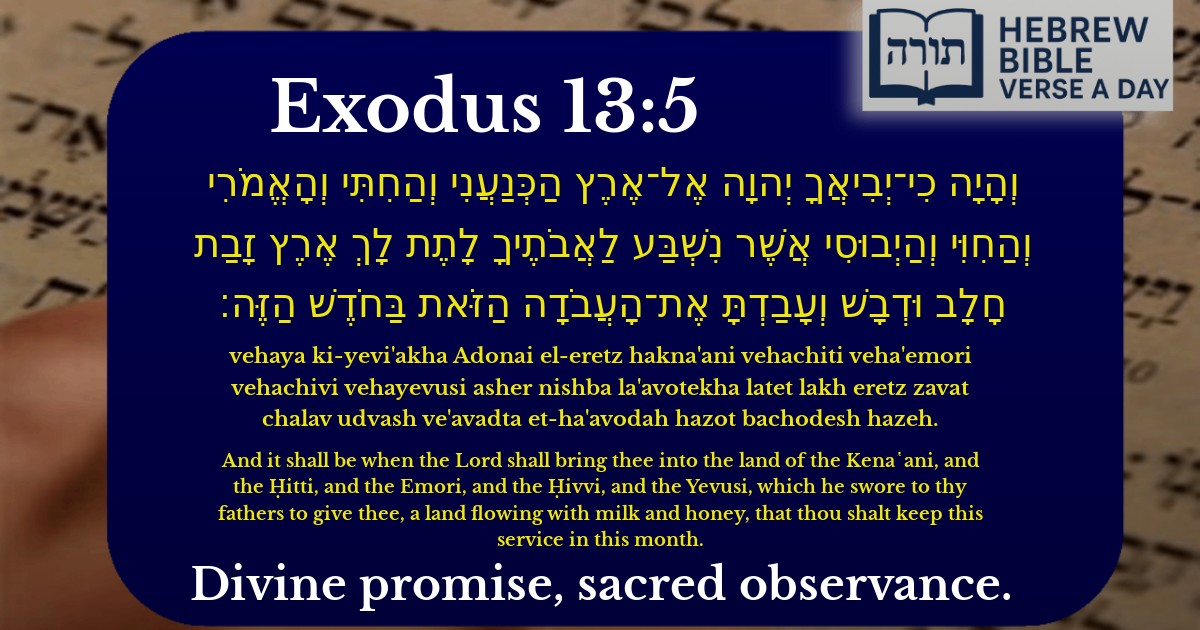Join Our Newsletter To Be Informed When New Videos Are Posted
Join the thousands of fellow Studends who rely on our videos to learn how to read the bible in Hebrew for free!
Hebrew Text
וְהָיָה כִי־יְבִיאֲךָ יְהוָה אֶל־אֶרֶץ הַכְּנַעֲנִי וְהַחִתִּי וְהָאֱמֹרִי וְהַחִוִּי וְהַיְבוּסִי אֲשֶׁר נִשְׁבַּע לַאֲבֹתֶיךָ לָתֶת לָךְ אֶרֶץ זָבַת חָלָב וּדְבָשׁ וְעָבַדְתָּ אֶת־הָעֲבֹדָה הַזֹּאת בַּחֹדֶשׁ הַזֶּה׃
English Translation
And it shall be when the Lord shall bring thee into the land of the Kena῾ani, and the Ḥitti, and the Emori, and the Ḥivvi, and the Yevusi, which he swore to thy fathers to give thee, a land flowing with milk and honey, that thou shalt keep this service in this month.
Transliteration
Vehaya ki-yevi'akha Adonai el-eretz hakna'ani vehachiti veha'emori vehachivi vehayevusi asher nishba la'avotekha latet lakh eretz zavat chalav udvash ve'avadta et-ha'avodah hazot bachodesh hazeh.
Hebrew Leining Text
וְהָיָ֣ה כִֽי־יְבִיאֲךָ֣ יְהֹוָ֡ה אֶל־אֶ֣רֶץ הַֽ֠כְּנַעֲנִ֠י וְהַחִתִּ֨י וְהָאֱמֹרִ֜י וְהַחִוִּ֣י וְהַיְבוּסִ֗י אֲשֶׁ֨ר נִשְׁבַּ֤ע לַאֲבֹתֶ֙יךָ֙ לָ֣תֶת לָ֔ךְ אֶ֛רֶץ זָבַ֥ת חָלָ֖ב וּדְבָ֑שׁ וְעָבַדְתָּ֛ אֶת־הָעֲבֹדָ֥ה הַזֹּ֖את בַּחֹ֥דֶשׁ הַזֶּֽה׃
וְהָיָ֣ה כִֽי־יְבִיאֲךָ֣ יְהֹוָ֡ה אֶל־אֶ֣רֶץ הַֽ֠כְּנַעֲנִ֠י וְהַחִתִּ֨י וְהָאֱמֹרִ֜י וְהַחִוִּ֣י וְהַיְבוּסִ֗י אֲשֶׁ֨ר נִשְׁבַּ֤ע לַאֲבֹתֶ֙יךָ֙ לָ֣תֶת לָ֔ךְ אֶ֛רֶץ זָבַ֥ת חָלָ֖ב וּדְבָ֑שׁ וְעָבַדְתָּ֛ אֶת־הָעֲבֹדָ֥ה הַזֹּ֖את בַּחֹ֥דֶשׁ הַזֶּֽה׃
🎵 Listen to leining
Parasha Commentary
📚 Talmud Citations
This verse is quoted in the Talmud.
📖 Berakhot 17a
The verse is referenced in a discussion about the blessings and promises of the Land of Israel, emphasizing its fertility and the divine promise to the ancestors.
📖 Sotah 11b
The verse is cited in the context of discussing the Exodus and the fulfillment of God's promises to bring the Israelites into a land flowing with milk and honey.


Context and Overview
This verse (Exodus 13:5) appears in the context of the mitzvah of sanctifying the firstborn and observing the festival of Pesach (Passover). It emphasizes the future fulfillment of Hashem's promise to bring Bnei Yisrael into Eretz Canaan, a land flowing with milk and honey, where they must continue the service of Pesach.
The Promise of the Land
Rashi explains that the enumeration of the seven Canaanite nations (here, five are mentioned) serves as a reminder that despite their current strength, Hashem will drive them out to fulfill His oath to the Avot (Patriarchs). The phrase "אֶרֶץ זָבַת חָלָב וּדְבָשׁ" ("a land flowing with milk and honey") is interpreted literally by Ramban (Nachmanides) as a sign of the land's fertility, where milk flows from goats and honey from dates and figs (as per Talmud, Ketubot 111b).
The Mitzvah of Pesach in the Land
The verse concludes with the obligation to observe "הָעֲבֹדָה הַזֹּאת" ("this service") in the month of Nissan. The Rambam (Hilchot Korban Pesach 1:3) clarifies that this refers to the Korban Pesach (Paschal offering), which was to be brought after entering Eretz Yisrael. The Sforno adds that this mitzvah would serve as an eternal reminder of the Exodus, reinforcing emunah (faith) in Hashem's providence.
Spiritual Significance
Historical and Ethical Lessons
The Kli Yakar emphasizes that the listing of the Canaanite nations serves as a warning: Bnei Yisrael must not emulate their corrupt practices (as noted in Vayikra 18:3). The gift of the Land is conditional upon moral and spiritual fidelity, a theme echoed by the prophets.